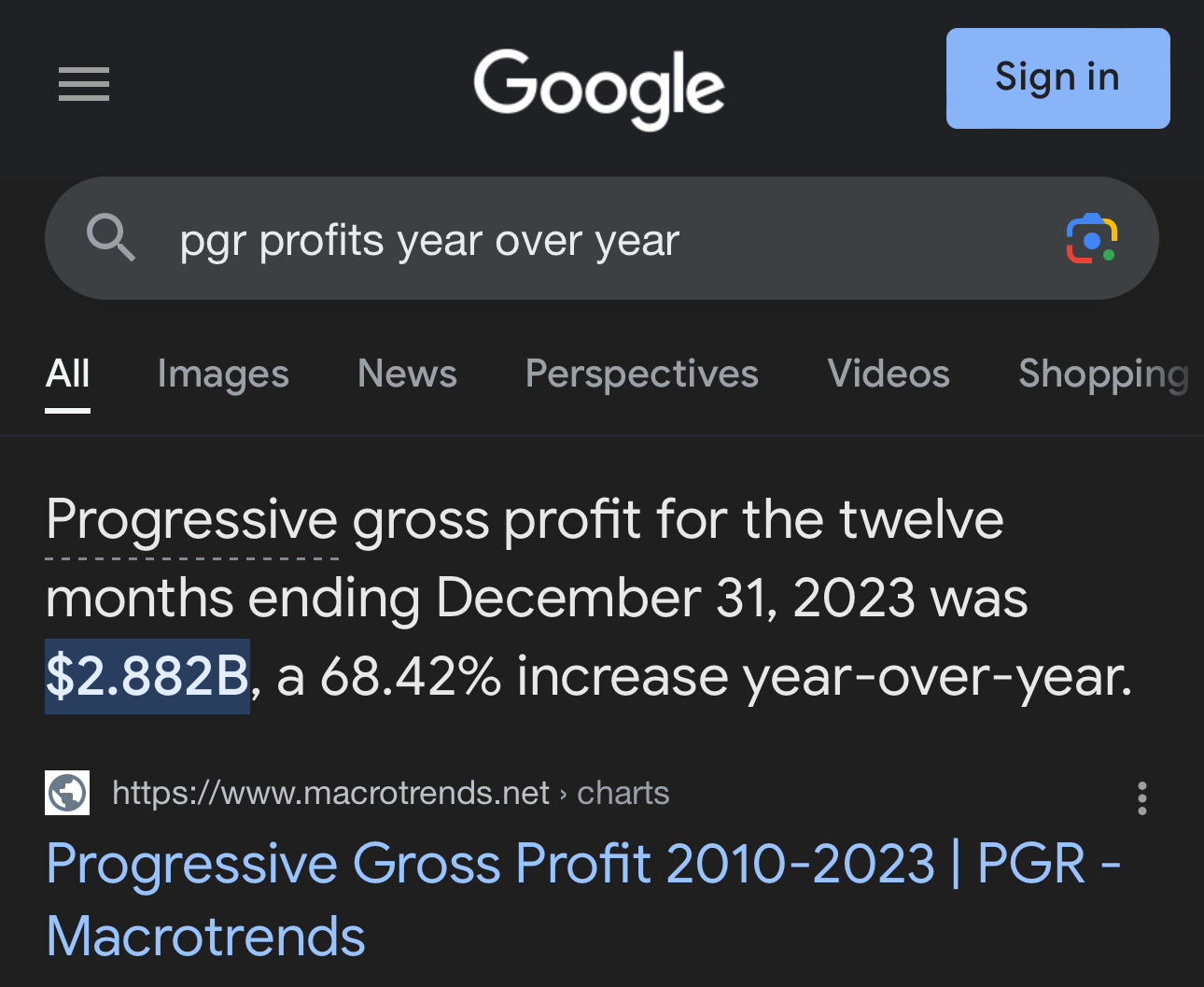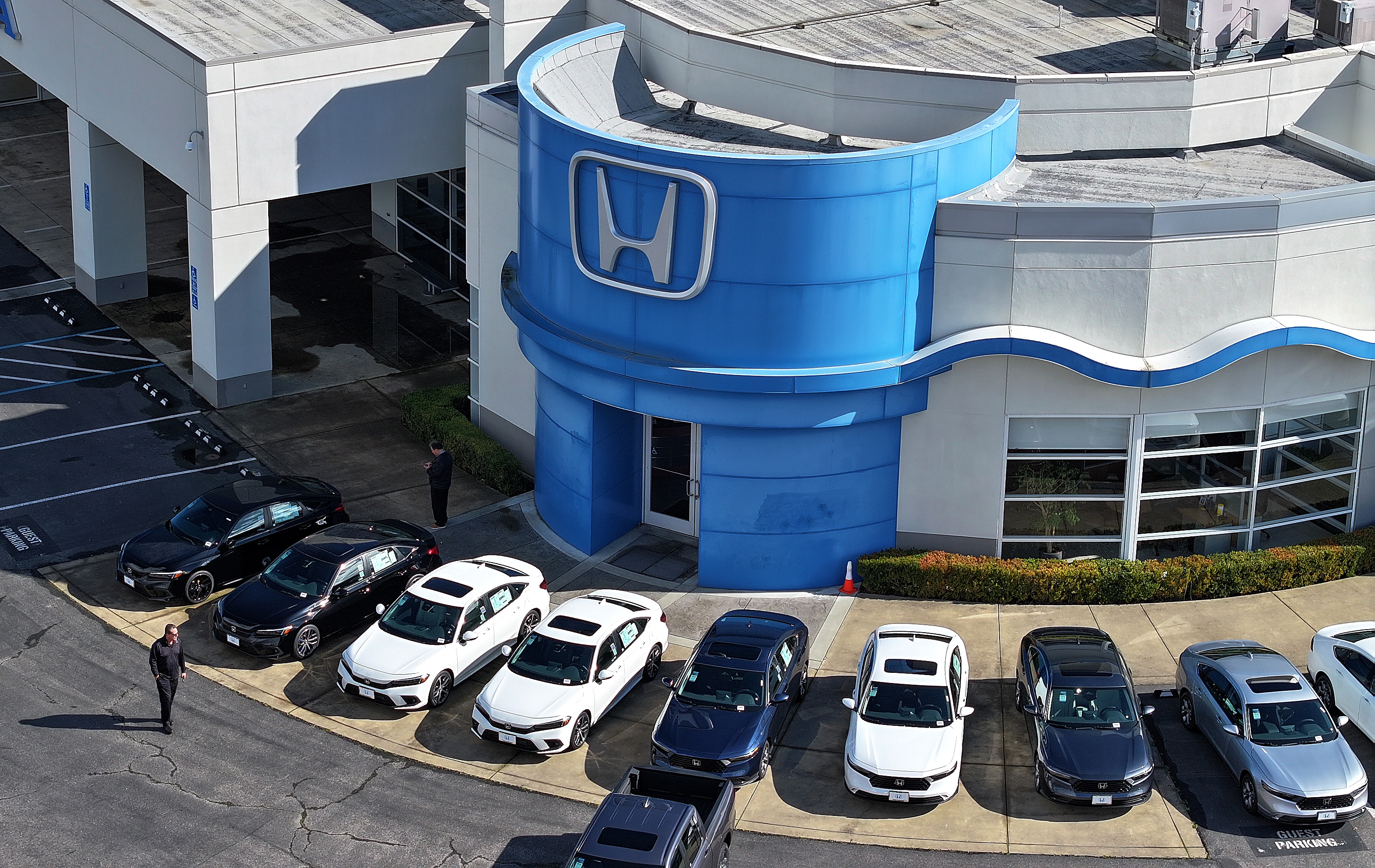Car insurance rates are surging as Americans struggle to pay for basic necessities and ongoing debt.
The newest Consumer Price Index shows car insurance spiked 20 percent year over year. The surge in pricing occurred after years of gradual price inflation, with earlier reports finding the rates grew by 36 percent since 2020.
That’s at the same time debt is soaring for many Americans. While Americans hold around 1.75 trillion in student debt loans alone, they also have $1.05 trillion in credit card balances not paid off.
Anecdotal but Liberty Mutual increased my rates annually, refused to lower cause I was at lowest rate possible (supposedly, even recalculating as a new customer). Went from 135 to 150 to 170 at last renewal. Then after contract renew I get hit for 205. Said they adjusted rates for everyone in my area and tough shit. And then had the audacity to demand 127 after I canceled my policy because it was a few days after a payment, and they claimed to have charged for the previous month. I remember paying the first month upon signing up with them, not as “accrued”, but a month and then being covered between them and the next payment.
Left them to State Farm and went from 156/month for 6 months DOWN to 125/month at renewal for 6 months. New Hyundai Venue (not one they refuse to insure due to theft), full coverage but the lowest possible.
I’m still mad about it but happy I left.
Shop around. Your loyalty means nothing to them.
I’ve been with State Farm for 20 years. Actual agent I have met with a few times. Have had one or two claims over the years and they worked with me pretty reasonably. My rates have never “jumped” but have had what I’d consider some minor bumps over the years. Of the many companies I’ve dealt with, they’re one that has at least not given me a huge headache.
I don’t have anything to do with them other than being a client, and mileage always varies, this is just my experience. I call out a lot of shitty companies, seems worth letting others know if one isn’t terrible. (Also, I live in a major metro, no idea what it would be like someplace else.)
Same, I’m with State Farm and meet with my agent every few years to make sure my coverage makes sense. The last time I met with her she was able to get me better coverage for what I need at a lower monthly cost. My rates have gone up and down a little over the years, but nothing major in either direction.
The price of cars is through the roof. It makes sense that insurance would go up to cover it.
When a new car is double what it was 10-15 years ago, our insurancehas to go up.
The issue here is stagnate wages.
And also insurance companies charging just as much as they can get away with.
The US system is designed to squeeze every last penny out of a person, to the point they can still “survive,” but not so much that they become destitute and can no longer buy things and pay for essential services.
That’s a bit dramatic. The way the market works: You charge a competitive price that allows you to cover your costs and make a profit. If your product provides enough value to the buyer, they’ll pay for it.
There is competition here, though. It’s not like it’s a single insurance company monopoly. You can usually get a better deal by shopping around.
The constraints everyone is working with are: vehicle prices and the cost of repairs. Both of those have gone way up. Insurance only works if they pay out less than they take in. If the cost to pay out rises, what they take in (aka what they charge) has to rise.
I’m not a fan of insurance companies. They aren’t your friend. it’s a business arrangement. But they aren’t colluding to eek every ounce of money from people. Those greedy bastards would undercut their competition in a heartbeat if they’d get more customers and make more money.
Like I said, the problem isn’t with the costs of these things as much as the stagnate wages. Wages haven’t kept pace with inflation and cost of living so you end up with things like $50-75k new vehicles when household incomes are…$50-75k.
It’s more expensive to replace vehicles and more expensive to repair them (like the article says) so everyone’s premiums are going up. But people aren’t getting paid more.
The way the market works: You charge a competitive price that allows you to cover your costs and make a profit. If your product provides enough value to the buyer, they’ll pay for it.
That’s what’s taught. There’s quite a bit more in practice, including: what insurance companies learned from management consultants.
But they aren’t colluding to eek every ounce of money from people.
Maybe so, though there appears to be a common interest.
There is competition here, though. It’s not like it’s a single insurance company monopoly. You can usually get a better deal by shopping around.
It’s kind of funny you mention this. I just sat down and went through every insurance company I could find (over 15 of them) that are still writing policies here in CA because Geico decided to jack my rates over 20% this renewal. Literally every one of them were within $5 every 6 months of the price Geico is charging me for the renewal.
Tell me again how I’m supposed to “get a better deal by shopping around”?
Oh he has no clue. He just parroted the propaganda he received in middle school.
I’m in the same boat except my rates went up 200% because of a single accident in the last 10 years. Fuck Geico and every other insurance company. Private companies should not be allowed in businesses where people have no choice. And I’m saying this as a libertarian mostly.
- People insist on driving larger cars, creating more severe accidents.
- People insist on driving more expensive cars, driving up replacement and repair costs.
- People insist on outlawing speed cameras and red light cameras, driving up accident rates and severity.
- People insist on increasing speed limits, increasing accident rates and severity.
- Roads and merge lanes are poorly designed as governments cut corners. Again, this increases accident rates and severity.
- States don’t test drivers regularly for competence. This means impaired drivers and poorly skilled drivers remain on the road, causing accidents.
- Urban police forces no longer enforce traffic laws in many cities, increasing accident rates.
- Some states are getting rid of car inspections. Which means more cars with bad tires and no headlights and more accidents.
Add inflation and greedflation, and It’s no wonder insurance rates are higher.
People insist on outlawing speed cameras and red light cameras, driving up accident rates and severity.
I can’t speak for your state, but red light cameras started being a great source of revenue from fines, so people started rigidly adhering to them. So this caused two problems.
-
While there were less T-bone accidents meaning people running red lights and hitting perpendicular traffic, all other types of accidents increased by 18% because people were hard stopping so as not to get fined and getting rear ended. source. So if your point is lower costs because of fewer accidents, Red light cameras increased accidents.
-
Because people were not running lights anymore, the fines from red light cameras went down. The money was so good that cities got greedy, they started randomly decreasing yellow light times to cause more people to run red lights to increase fines again video source
Also in my area people started shooting out the redlight cameras cause they were fining people who were following the law to a T. The cops were outright working with the city maintenance guys to cut the wire on the damned things because they were getting pissed having to deal with the complaints.
-
Red light cameras cause accidents because people slam on their brakes too hard.
Or, someone’s following distance is too short.
Agreed, but defense driving dictates that you should be aware of the tailgating asshole behind you
… and not be speeding in the first place.
None of this is the fault of any enforcement action, it’s the fault of poor driving.
I’d think both cause accidents and it’d be better to replace lights as we know them whether that is with roundabouts or with more intelligent lights. I’d personally love to know how much time I have remaining on a light so I know if I can make the protected turn or if I should slow.
I’ve seen lights like that before. They were more of a distraction in my opinion. I’ve also seen lights that cycle back from red, attempting to allow people to clear the intersection before being tboned I guess?
Maybe the solution is to instead re-educate everyone on how to drive in such a manner as to consider the traffic behind them.
Which do you think is a costlier and deadlier accident:
- someone slamming on their brakes and getting rear ended by a car that’s already coming to a slow/stop behind them
- someone going at speed or faster through a red light and intersecting with an accelerating vehicle
The solution to accidents is not “more accidents”
Most of the time, a red light camera causes someone to slam on their brakes to avoid passing through the red light, instead of just going straight through safely.
It happens often when the light changes just before you get to the intersection and you’re going just fast enough that you’d have to slam on your brakes or go through the red light the second after it changes to red. Slamming on your brakes is more dangerous than moving through a clear intersection.
You’re making assumptions here.
Scenario 1: You’re assuming that everyone is observing adequate stopping distance, has working brakes, and is adequately paying attention to slow down.
Scenario 2: You’re assuming that green means it’s safe to go and that the cross traffic light turns green simultaneously with a given light going red.
Let’s address the easy stuff first.
In scenario 2, if my light just turned red that means the opposite light just turned green. This isn’t how stop lights work in practice. Usually, both sides of traffic are stopped momentarily before a light turns green such that traffic in the intersection can clear. Also, if you see a stop light that’s red you are usually slowing down. In other words, right before cross traffic gets a green light they are either stopped or slowing down, assuming they can adequately pay attention.
Cars have mass. You don’t instantaneously go from 0 speed to speed limit. It takes a ramp up time. It is generally low risk to run a stop light immediately following a light change.
Now to address both scenarios, we have to talk about defensive driving.
- Never assume someone is doing the right thing. If your light turns green, make sure cross traffic is slowing down before you proceed. Be ready to slam on your brakes if someone is going to blow through a red light late and at speed
- You can’t break physics. If the person behind you is not able to stop and you can safely make it through the intersection, do so. Otherwise, pick the safer of two accidents and learn from your mistakes.
You forgot the big part
As an example, progressive insurance

It’s more profitable to raise rates, and they can get away with it
Some of these are valid. But speed cameras do fuck all for safety. They are a private company scam to take money from people
The better way to go about it is to redesign roadways to force people to slow down. Narrower lanes, trees on each side, no more 6-lane highways through semi-residential and mixed-use areas. And then invest in public transportation so that fewer people even need to drive their own cars.
But I’m preaching to the choir on Lemmy and hoping for hell to freeze over.
Thanks for pointing that out.
Those first two, the “people” are largely the auto manufacturers.
Smaller and cheaper cars are SUPER popular in the rest of the world and are literally not available at all in the US. The auto mfgs will tell you it is because of US preference, but in a country of 330 million, there doesn’t need to be that much demand compared to these vehicles popularity in, say, a cheese-loving nation of 65 million. Even if they are immensely less popular, there is still MORE than enough market for some of these ALREADY-BEING-PRODUCED vehicles.
But the US auto mfgs refuse. They go bigger and more expensive. The US consumer has no real choice.
For your fourth and fifth, the “people” are US civil/transportation engineers. They must be stopped. They are a scourge. There’s no culture of safe road engineering in the US. AASHTO are an association of insane fuckwits.
I am incredibly skeptical that the behaviors of US drivers are significantly different than anywhere else in the world. I’m pretty skeptical of worries over inspections or licensing requirements and am CERTAIN that additional police enforcement will only cause more mayhem and death and not protect any life. I believe it’s almost entirely a problem of road engineering, urban design, and vehicle design.
Mfgs also don’t produce as many of the base trims so it limits choice further. Then on top of that the dealers tend to mark cars way up. Cars in general are just way overpriced since COVID started and some mfgs are still claiming supply chain issues so they artificially limit supply further.
To the point about manufacturers, it’s also an issue with emissions laws, because smaller cars have more restrictions on emissions. So rather than figure out how to make cars run better, everyone is making bigger vehicles so they fall into a lower emissions requirement classes.
But they do produce smaller cheaper cars that can follow those emissions standards - for markets like Germany or the Netherlands. They just refuse to go through the process of certifying and selling those same vehicles in the US market.
Not to be all tinfoil hat, but I think they have a gentleman’s agreement to just not be competitive like that in the US market because they can get away with it. Because the US consumer is gullible and our Regulators are asleep at the wheel.
People insist on driving more expensive cars, driving up replacement and repair costs.
It’s not like the average US consumer has a say in this. The cheapest car you can drive off a lot is like 25k now. We could have less expensive cars but for half a century we’ve used tariffs to provide an unfair competitive advantage to our domestic motor companies who only took advantage of it to price gouge.
You’re missing the part where people spend $80k cars on a loan each five years because they are financially illiterate.
Another factor (in the US at least) is over-litigation of any and all traffic incidents. Seems like the default practice now is to get lawyers involved for a fender bender that breaks one tail light. The “at fault” drivers insurance ends up using lawyers to go back and forth haggling with the “victim” drivers lawyers and they finally settle on some ridiculous payment that is 10x what the actual damage was. All that cost gets passed on to everybody who buys car insurance.
Speed limits dont decrease acidents. They are the most famous example of a safety feature not working
If the road is made for 90km/h, wide and with good sight lines, reducing legal speed to 70km/h doesn’t do much. There also needs to be made adjustments to the road so you cannot drive faster than 70km/h. Well so you aren’t natirally incentiviced to drive faster than you should.
Once the state of Montana had no speed limits out side ot towns. When they added speed limits there was no change to traffic accidents or deaths.
We have a lot of roads in the US now with speed limits closer to 105-115km/h. When you get up to this range your vehicles start dropping fuel efficiency too due to loss from wind drag.
This list is true and depressing. People in this country should not be running it. It’s a daycare run by children.
-
People insist on driving larger cars, creating more severe accidents.
-
People insist on driving more expensive cars, driving up replacement and repair costs.
Electric cars are a contributing factor to both of these trends.
With respect to more expensive cars, people don’t have a choice.
The most sold vehicle in the USA are oversized pick-up …
The most sold vehicle in the USA are oversized pick-up …
I’d like to see the figures you’re looking at. SUVs are usually counted as “light trucks”, and manufacturers have killed off a lot of car lines and replaced them with SUVs.
More people are buying electric cars. Electric cars are heavier, and so are electric “light trucks”. More electric cars on the road is going to push the average weight of vehicles on the roads upwards. Heavier cars take farther to stop and they aren’t as nimble. Heavier vehicles are more likely to be involved in an accident, and accidents are going to be more severe.
The F-150 Lightning weighs 6,500 pounds (2,900 kg), over 35% more than the internal-combustion-engine (ICE) powered equivalent F-150, with most of the additional weight a result of the Lightning’s 1,800 pounds (820 kg) battery. The F-150 Lightning was one of several electric vehicles cited by National Transportation Safety Board head Jennifer Homendy as being significantly heavier than ICE-powered models and thus raising the risk of other road users being killed or seriously injured in collisions, alongside products from other manufacturers such as General Motors and Volvo.
https://en.wikipedia.org/wiki/Ford_F-150_Lightning#Overview
US official warns of risks posed by heavy electric vehicles
The official, Jennifer Homendy, raised the issue in a speech in Washington to the Transportation Research Board. She noted, by way of example, that an electric GMC Hummer weighs about 9,000 pounds (4,000 kilograms), with a battery pack that alone is 2,900 pounds (1,300 kilograms) — roughly the entire weight of a typical Honda Civic.
-
Could be related. Low credit scores can lead to higher insurance prices. But that doesn’t seem right because the actual risk shouldn’t have likely changed. Could be higher repair costs. Of course simple corporate greed could be to blame. Didn’t need to actually say that one did I?
My car insurance went up $1200 this year, which blows my mind. No reason given.
Two years ago I was paying 1300 a year now I’m paying 1700 for six months and I’ve literally had nothing change in my driving record.
Used car prices went up, new car prices went up, collision repair prices went up, and repair time increased significantly. We also saw a huge increase in accident severity and a growing trend toward more aggressive driving.
The article lists several factors:
Because car prices in general have skyrocketed, more Americans are keeping their current cars for longer. This means costly repairs can become more likely, and the car insurers have adjusted their rates accordingly.
In the last year, car repair prices also climbed 7 percent, outpacing inflation by more than double.
A supply chain slowdown and ongoing labor shortages have also pushed the insurance industry to implement price hikes on customers, insuranceQuotes.com analyst Michael Giusti said.
“None of that even mentions the higher medical costs they have to pay after accidents,” Giusti said. “Today’s higher premiums are just a reflection of those higher costs.”
The sudden rise of electric vehicle purchases also carried some of the blame, since EVs are more expensive to purchase and repair, Henn said.
Because car prices in general have skyrocketed, more Americans are keeping their current cars for longer. This means costly repairs can become more likely, and the car insurers have adjusted their rates accordingly.
This makes zero sense as insurance doesn’t cover vehicle maintenance/repairs.
I’m pretty sure you can get coverage for repairs
They fight tooth and nail not to pay for an accident. How the hell is anyone getting money for repairs?
I don’t understand how more costly repairs translate to higher insurance premiums. The insurance companies aren’t paying to replace your engine.
Also their $2500 average yearly premium is insane. I’m in my 30s with two cars and two drivers insured, including comprehensive and the highest coverage progressive offers, and a 100 mile round trip commute, and it’s only $1400 a year.
Your insurance might not be paying for your engine, but if you hit someone else, the liability policy will cover the car you hit engine
That goes along with more expensive cars. They’re referring to people who’ve kept their car longer than average and have expensive maintenance items. If someone crashes into a 15 year old car hard enough, they’re just going to total it out. For less severe collisions, they’ll restore the car to what it was before the crash, not what it was when new.
My car insurance went up $1200 this year, which blows my mind. No reason given.
Kind of like jobs. If you stay with the same company for more than a couple years, you’re probably doing yourself a disservice.
What car do you have? Is it a Kia or Hyundai?
Chevy Volt and a Town & Country.
My car insurance went up $1200 this year, which blows my mind. No reason given.
Damn, what the hell. I pay about 15% of that for comprehensive coverage here in Germany. I guess that evens it out with the cheap fuel that you guys have.
I live in a no-fault state, which I love, but our insurance rates here are among the highest in the nation.
No fault insurance just means my insurance pays me, not whomever I get into an accident with. I do business with a company I trust to take care of me, so I don’t have to care if I’m in an accident with someone with shit insurance.
Not everyone here is a fan due to high prices, but I like it. I’ve seen too many friends in other states get low-ball offers that they either had to accept or be without a car for weeks while they appeal.
Ironically, it wouldn’t matter because the only accidents I’ve been involved in were with deer (who are notorious for carrying no insurance) so I’ve never been in an accident where no fault actually helped me.
I live in a no-fault state, which I love, but our insurance rates here are among the highest in the nation.
My experience living in a “no-fault” state was that someone rear-ended my wife who was stopped at a red light but insurance wouldn’t do jack because it was a “no-fault” accident. We paid higher for liability there than anywhere else we lived. Not a fan.
What is supposed to happen there is you get your car fixed by your insurance and if the other driver is liable your insurance collects your deductible from them to pay you back. I don’t believe they are allowed to just say they won’t fix it, but if the other driver isn’t determined to be at fault on the accident report, the deductible is yours to pay which often means small accidents aren’t worth the claim.
Geico gave me a reason, “The reason why we are increasing your rate is because there are more people in your area who drive without insurance”
I’m sorry, but how the fuck is that my problem? Also, isn’t that the whole fucking point of the full cover insurance I am required to pay while I’m making payments on the car?
I’m sorry, but how the fuck is that my problem? Also, isn’t that the whole fucking point of the full cover insurance I am required to pay while I’m making payments on the car?
Insurance always wins. If you have full coverage they have to pay when you get hit by them. They don’t want to pay.
Imagine buying a new car in 2024
I wouldn’t buy any car made after like 2005 anyway, way too much computerized crap and too many important parts made out of aluminum or plastic.
deleted by creator
You don’t use an adblocker?
deleted by creator
Use Firefox. It has support for ublock origin. Makes mobile browsing so much better.
deleted by creator
Well, there’s your first problem.
deleted by creator


















